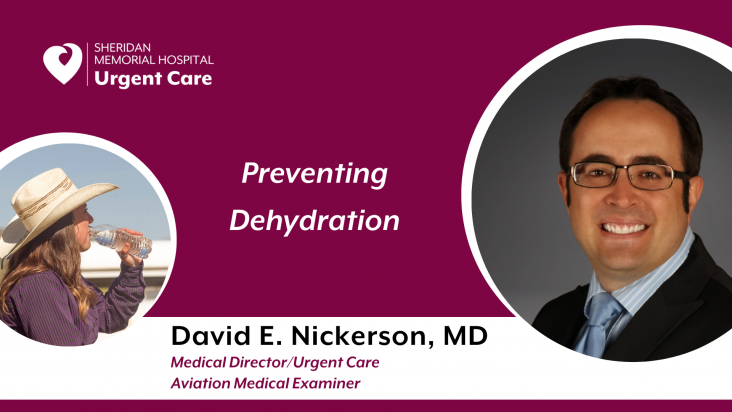By David Nickerson, MD – Medical Director of Sheridan Memorial Hospital’s Urgent Care
Summer weather calls many of us to spend more time outdoors. While this time of year brings a welcome respite from our cold Wyoming winters, it also brings higher temperatures and a greater risk of dehydration. Dehydration is the loss of too much water from the body and can disrupt its normal processes. While mild dehydration is easily treated by drinking fluids, severe dehydration can lead to organ dysfunction and is a medical emergency that requires prompt treatment.
Although dehydration can also occur with increased fluid loss from vomiting, diarrhea, fever, or certain medications, an additional risk in the summer comes from warmer outdoor temperatures. Heat-related dehydration is a risk for any age group. For example, infants do not have the ability to move themselves to a cooler environment or increase their fluid intake. High school football players, who sometimes practice twice a day in the intense August heat, are also at risk. Working adults such as roofers and firefighters exert themselves in hot environments. In fact, with physical exertion in hot, dry conditions, the human body can lose 1-2 liters of fluid per hour.
Dehydration can be prevented or treated with self-monitoring and oral rehydration. Early symptoms to watch for include increased thirst and dry mouth, lips, or eyes. Additional fluid loss can progress to fatigue, confusion, dizziness, and organ dysfunction. The well-hydrated body produces pale to clear urine, which becomes progressively darker to yellow and then brown with increasing dehydration.
You can avoid dehydration by drinking plenty of fluids such as water or sports drinks and avoiding caffeine and alcohol. Keep in mind that diarrhea, vomiting, and fever all increase your water loss and can also predispose you to dehydration and heat-related illnesses. Hydrate to the point that your urine is pale yellow or clear.
As an additional preventative measure, be mindful of the weather forecast and be willing to adjust your plans for the day. If it is going to be hot, don’t make big plans for exertion, and be sure to bring plenty of water. Plan any exercise, hikes, or outdoor work earlier in the day, when it is not as hot and you will lose less fluid through sweating.
However, if you or someone else begin to experience dark urine, fatigue, confusion, or dizziness despite attempts to rehydrate orally, seek medical attention immediately. Our emergency department or urgent care can quickly check your hydration status, electrolytes, and organ function and give IV fluids if necessary. Enjoy the summer weather, but do so safely!
If you or someone you love needs medical attention, we can help! Visit SheridanUrgentCare.com or click HERE to save your spot online at Sheridan Memorial Hospital’s Urgent Care or call us at 307.675.5850.

